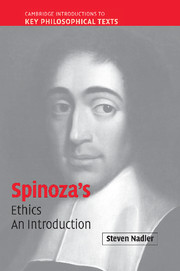Book contents
9 - Eternity and blessedness
Published online by Cambridge University Press: 05 June 2012
Summary
The deeper one goes into the Ethics, and the further one proceeds from the metaphysics and epistemology of the early propositions into the domains of psychology, social and political philosophy, and moral philosophy, the wider is the range of intellectual contexts within which Spinoza's ideas can be situated. While Parts One and Two should be understood primarily in a Cartesian framework, with Spinoza offering a kind of critical commentary on Descartes's conception of substance and the human being, Parts Three and Four clearly owe a debt to Spinoza's study of Hobbes and of ancient Stoic thinkers. The Stoic element is, as we shall see, in even greater evidence in Part Five, wherein Spinoza finally provides some instruction as to how to move toward the life of reason. But Part Five also represents Spinoza's dialogue with another important tradition, medieval Jewish rationalism. This relationship is only rarely studied in connection with the Ethics – a fact that is quite surprising, given Spinoza's personal background and education. In fact, much of the scholarly frustration directed at some central features of Part Five is, I believe, due to the failure to appreciate the degree to which Spinoza is engaged with his Jewish philosophical ancestors.
By the end of Part Four, we know a good deal about the free person, including many things about what he believes and how he acts. His desires are directed by reason and his deeds informed by virtue.
- Type
- Chapter
- Information
- Spinoza's 'Ethics'An Introduction, pp. 248 - 274Publisher: Cambridge University PressPrint publication year: 2006



